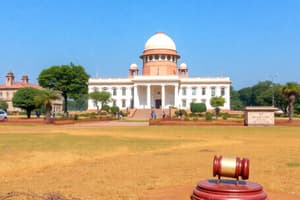Podcast
Questions and Answers
For offences committed under this Act by a Central Government employee, which procedure must the court follow to take cognizance?
For offences committed under this Act by a Central Government employee, which procedure must the court follow to take cognizance?
- Section 190 of the Criminal Procedure Code, 1973.
- Section 200 of the Indian Penal Code, 1860.
- Section 197 of the Code of Civil Procedure, 1908.
- Section 197 of the Code of Criminal Procedure, 1973, as it applies in Maharashtra. (correct)
Which court is competent to try punishable offenses under this Act?
Which court is competent to try punishable offenses under this Act?
- A court inferior to that of a Metropolitan Magistrate or a Judicial Magistrate of the first class
- A court no lower than that of a Metropolitan Magistrate or a Judicial Magistrate of the first class (correct)
- A court no lower than that of a Judicial Magistrate of the second class
- Any court of competent jurisdiction
Under this Act, how are offenses classified regarding cognizability?
Under this Act, how are offenses classified regarding cognizability?
- Cognizable, but only with a warrant
- Cognizable
- Non-cognizable (correct)
- Cognizable for repeat offenders only
For an offense alleged to have been committed by a Requiring Body under this Act, who must file the written complaint for the Court to take cognizance?
For an offense alleged to have been committed by a Requiring Body under this Act, who must file the written complaint for the Court to take cognizance?
If a Collector faces opposition while taking possession of land under this Act and is NOT a Magistrate, what action must be taken?
If a Collector faces opposition while taking possession of land under this Act and is NOT a Magistrate, what action must be taken?
According to the Act, how should a notice be served?
According to the Act, how should a notice be served?
What should be done if the person named in the notice cannot be found for service?
What should be done if the person named in the notice cannot be found for service?
Under what conditions can a notice be sent by post for service?
Under what conditions can a notice be sent by post for service?
What options does the appropriate Government have regarding the acquisition of land, according to this Act?
What options does the appropriate Government have regarding the acquisition of land, according to this Act?
If the appropriate Government withdraws from the acquisition of land, what is the Collector required to do?
If the appropriate Government withdraws from the acquisition of land, what is the Collector required to do?
Under what circumstance can the provisions of the Act NOT be used to acquire a part of a house or building?
Under what circumstance can the provisions of the Act NOT be used to acquire a part of a house or building?
When a question arises whether a land forms the part of a house or building, who makes the determination according to the Act?
When a question arises whether a land forms the part of a house or building, who makes the determination according to the Act?
Following a reference regarding the acquisition of part of a building, what aspect MUST the Authority consider?
Following a reference regarding the acquisition of part of a building, what aspect MUST the Authority consider?
If land is required after a reference regarding part of a building, what procedural step is NOT necessary?
If land is required after a reference regarding part of a building, what procedural step is NOT necessary?
What is the legal implication if the Collector, who is also a Magistrate, is resisted while taking possession of land under this Act?
What is the legal implication if the Collector, who is also a Magistrate, is resisted while taking possession of land under this Act?
How many national daily newspapers must contain the notice if the Collector or Judge directs a notice to be published?
How many national daily newspapers must contain the notice if the Collector or Judge directs a notice to be published?
What is the key criterion determining whether the appropriate Government can withdraw from acquiring a piece of land?
What is the key criterion determining whether the appropriate Government can withdraw from acquiring a piece of land?
Apart from delivering or tendering a copy of the notice, what other step MUST be taken to serve notice effectively when the person named cannot be found?
Apart from delivering or tendering a copy of the notice, what other step MUST be taken to serve notice effectively when the person named cannot be found?
Which of the following scenarios allows the appropriate Government to initiate fresh acquisition proceedings under sections 11 to 19 even after initially deciding to acquire only part of a building?
Which of the following scenarios allows the appropriate Government to initiate fresh acquisition proceedings under sections 11 to 19 even after initially deciding to acquire only part of a building?
Imagine a scenario where the Collector is seeking to enforce the surrender of land, but is neither a Magistrate nor able to secure the assistance of one, and the Commissioner of Police is unavailable. According to the implicit powers within the Act, what recourse does the Collector realistically have, considering potential legal challenges and the need to uphold the Act's objectives?
Imagine a scenario where the Collector is seeking to enforce the surrender of land, but is neither a Magistrate nor able to secure the assistance of one, and the Commissioner of Police is unavailable. According to the implicit powers within the Act, what recourse does the Collector realistically have, considering potential legal challenges and the need to uphold the Act's objectives?
Flashcards
Offences by Government officials
Offences by Government officials
If a government official commits an offense under this Act, the court will only acknowledge it if the procedure in section 197 of the Criminal Procedure Code, 1973 is followed.
Competent Court
Competent Court
Only a Metropolitan Magistrate or a Judicial Magistrate of the first class can try offenses under this Act.
Nature of offenses
Nature of offenses
Every offence under this Act shall be deemed to be non-cognizable.
Cognizance of offences
Cognizance of offences
Signup and view all the flashcards
Enforcing Surrender
Enforcing Surrender
Signup and view all the flashcards
Serving Notices
Serving Notices
Signup and view all the flashcards
Service on individuals
Service on individuals
Signup and view all the flashcards
Withdrawal from Acquisition
Withdrawal from Acquisition
Signup and view all the flashcards
Acquisition of part of house
Acquisition of part of house
Signup and view all the flashcards
Land part of house
Land part of house
Signup and view all the flashcards
Study Notes
- Regarding offences by government officials under this Act, courts can only acknowledge such offences if the procedure in Section 197 of the Criminal Procedure Code, 1973, as applicable in Maharashtra, is followed.
Cognizance of Offences by Court
- Only a Metropolitan Magistrate or a Judicial Magistrate of the first class is competent to try offences under this Act.
Nature of Offences
- All offences under this Act are deemed non-cognizable, regardless of what the Criminal Procedure Code, 1973, states.
Complaint Requirements
- Courts cannot acknowledge offences by a Requiring Body unless a written complaint is made by the Collector, an officer authorized by the appropriate government, or a member of the affected family.
Magistrate's Role in Enforcing Surrender
- If the Collector faces opposition when taking possession of land, they must enforce the surrender themselves if they are a Magistrate.
- If the Collector is not a Magistrate, they must apply to a Magistrate or the Commissioner of Police, who will then enforce the surrender to the Collector.
Serving Notices
- Notices under this Act are served by delivering a signed copy.
- For general notices, the Collector orders the signing.
- When possible, the notice should be served directly to the person named.
- If the person is unavailable, the notice can be served to any adult family member living with them.
- If no adult family member is available, the notice can be affixed to the outer door of the person's house or business, or in a conspicuous place in the officer's office, the Collector's office, the court-house, and on the land to be acquired.
- A notice can be sent by post to the person's last known address and published in at least two national daily newspapers and also on the Collector's website, if directed by the Collector or Judge.
Withdrawal from Acquisition
- The government can withdraw from acquiring land if possession has not been taken.
- If the government withdraws, the Collector must determine and pay compensation to the owner for damages suffered due to the notice or proceedings and cover costs incurred.
Acquisition of Part of a Property
- This Act cannot be used to acquire only part of a house, factory, or building if the owner wants the entire property acquired.
- The Collector must refer to the Authority if there's a question about whether the land is part of a house, factory, or building and cannot take possession until the question is settled.
- The Authority should consider whether the land is needed for the full use of the property when deciding on the reference.
- No new declarations or proceedings are needed if the land is required.
- The Collector must provide a copy of the government's order to the person and proceed to make their award.
Studying That Suits You
Use AI to generate personalized quizzes and flashcards to suit your learning preferences.




